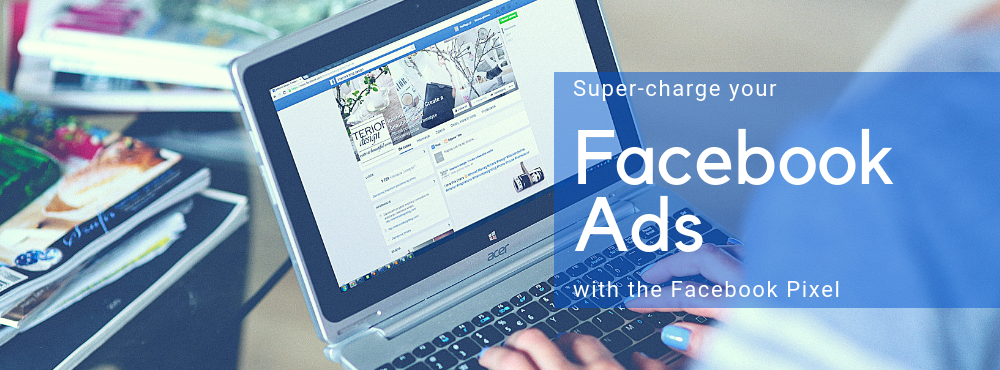In recent years, the use of Facebook advertising has grown exponentially. With Facebook’s acquisition of Instagram in 2012 and the launch of the Audience Network program in 2014, you can now reach more people than ever before, targeting specific demographics at a granular level.
While the potential reach is exciting for businesses, it’s important to optimise your Facebook ads to ensure you are not over-spending and that you are targeting the right people for the right reasons, with the right type of creative.
As Facebook is such an easy platform to begin advertising on, many people begin by either spending too little or too much and aren’t aware of or don’t utilise the tools available to them to refine and create more effective adverts.
One of the tools available to all businesses is the Facebook Pixel. Below I will explain why the pixel is such an important tool and how to utilise it for your business.
What is the Facebook Pixel?
The Facebook Pixel is a piece of code which you embed into your website to track visitors actions and help measure the effectiveness of your advertising, as well as deliver ads more effectively.
To use the Facebook Pixel, you must have access to a Business Manager account. Business Manager is a Facebook platform that provides a central place for advertisers to manage their marketing across their business and with external partners, keeping business and personal profiles separate. It gives you the ability to track your ads, manage pages and ad accounts, and add an agency or other 3rd parties to help manage your marketing.
You can read more on how to create a Business Manager account here.
Why should I use the Facebook Pixel?
The pixel has many benefits – guiding lead generation, ad targeting, remarketing, conversion measuring and optimisation strategies. It can also help you track customer behaviour across multiple devices.
For example, you could use the Facebook Pixel to analyse the most frequently visited pages on your website and then optimise your campaigns to promote those pages. Or you could use it to segment your audiences by the frequency of their visits and the time spent on your website, then target campaigns to those who spend more time and are familiar with your brand, and are therefore more likely to turn into paying customers.
Overall, the pixel enables you to make cost-saving adjustments to your advertisements, by allowing you to build effective advertising audiences, measure cross-device conversions and better evaluate your return on ad spend by attributing behaviours to your adverts.
How do I use the Facebook Pixel?
You can generate a pixel through Business Manager. You must either have your own Business Manager account or be allocated as admin on the Business Manager account you need to use.
Each Facebook ad account is limited to one pixel, however businesses that need multiple pixels can create up to 10 per Business Manager account.
The pixel has three installation options. You can:
- Use an integration or tag manager
- Manually install the code yourself
- Email the code and instructions to your developer
There are two types of code that need installing on your website to allow the pixel to work:
- Base code for the pixel needs installing on all pages on your website to provide a baseline for measuring specific events. Base code is designed to collect data on views and provide a baseline for Event code.
- Event code needs to be added to every page you wish to track a specific event on, usually relative to your business goals.
You can specify which actions should activate the pixel, i.e. website search, add to cart or sign up to a newsletter. It comes pre-programmed with a set of 9 standard events (below), but you can create custom events based on your business goals.

Once you have installed the pixel code, you need to verify that the pixel works by using the Facebook Pixel Helper plugin to check for errors and understand the data that it is tracking. You can install the Facebook Pixel Helper plugin into your Chrome web browser, then check the popup to view any pixels found on that page and whether or not they’ve been set up successfully.
Creating a strategy with Facebook Pixel
The Facebook Pixel helps you to identify how people move between devices on your website, which areas of your website they visit and what they do there. You can build ads based on this information, resulting in more targeted ad delivery through remarketing and lookalike audiences.
Remarketing
Remarketing (or retargeting) is the process of targeting ads directly to people who have already visited your website.
You could use the Facebook Pixel to track those who have visited your website, but not completed a positive action e.g. visiting a certain product page, subscribing to a newsletter, browsing a particular category, etc. These positive actions are called ‘events’.
For example, if someone visits your website and adds something to their shopping basket, but doesn’t check out, you can then specifically target an ad to that person where the creative encourages them to continue with their purchase, perhaps by offering them a time-limited discount code or first purchase offer.
Custom and Lookalike Audiences
The Facebook Pixel can be used to generate custom audiences, from which you can build lookalike audiences.
Custom audiences are built from the data the Facebook Pixel collects from visitors to your website and/or existing customers from your CRM or database. These are people who will already know your business on Facebook.
For example, you could upload your e-mail subscription database to be able to target those people with ads as well as your regular e-mails. Another example of custom audience would be segmenting people who visit certain sections of your website, perhaps based on the products or services they engage with.
You should design remarketing ads for a custom audience using what you already know about your existing customers, tailoring the design to encourage people to engage and convert.
If you use a website Custom Audience as the reference (seed) for a lookalike audience, Facebook will deliver ads to people who are similar to the original audience generated by the pixel and/or your data. This is a great way to target people who are likely to become high-value customers.
Should you use the Facebook Pixel?
While the idea of using the Facebook Pixel may feel overwhelming, the actual process of installing and making use of its data is not as complicated as it sounds. The benefits in terms of results you can achieve with the data it collects massively outweigh any concerns you might have regarding its setup.
If you’re looking to optimise your advertising campaigns through Facebook, the Facebook Pixel is a great place to start.





